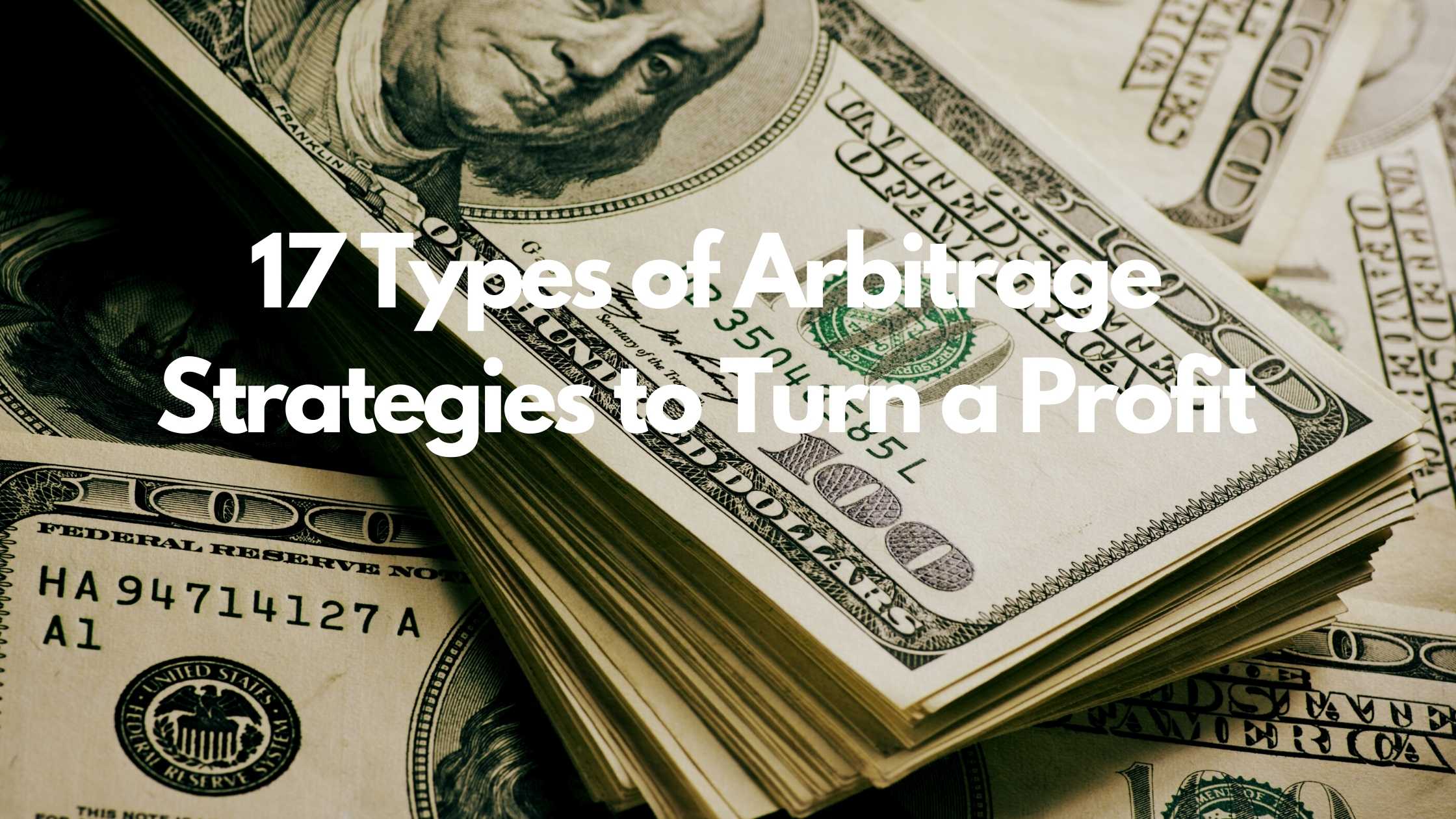
17 Types of Arbitrage Strategies to Turn a Profit

Markets are rarely perfect, hence there’ll always be price discrepancies on almost all types of commodities. Be it basic goods, assets, or even properties.
These inefficiencies point to tons of possibilities, such as numerous arbitrage techniques that can yield significant returns.
How then can you spot these arbitrage trading strategies? By being curious. Keenly observe everything around you to identify the various types of arbitrage available.
But beyond this, you’ll need to ensure that for each arbitrage process, your profit is secure.
This handy article will reveal to you at least 17 profitable arbitrage strategies to consider.
What is Arbitrage?
Arbitrage is a trading opportunity where individuals, corporate entities, or arbitrageurs as they’re commonly known, take advantage of loopholes in an economic, financial, or regulatory system to make a buck.
The loophole is often a price discrepancy in a commodity with the main mantra being ‘buy low to sell high’.
17 Types of Arbitrage
How can you spot an arbitrage opportunity? It’s easy. When there are two equivalent assets with differing prices, there’s an arbitrage opportunity.
Arbitrage is especially popular in the stock and commodities market. It’s also the driving force behind several industries from antiques to cryptocurrency.
To know more, check out the arbitrage techniques below.
- Retail Arbitrage
This particular arbitrage strategy involves the selection of specific goods that are popular from certain brick-and-mortar retail stores to resell to a diverse online audience.
To ensure you realize a profit, you need to source the goods when there’s a clearance sale, or when you’re sure the buying price gives you a wide margin.
Sounds easy but to get the most incredible items would require utter dedication as it involves you scouring countless retail stores for the perfect items and deals.
Your target market comprises people who want cool stuff but don’t have the time or the inclination to look for them. You’re saving them time and offering convenience for which they’ll gladly pay the price.
To succeed in retail arbitrage, here’s what you need to pay attention to:
- Pick a commodity that you love or understand and can comfortably specialize in.
- Become adept at spotting trends and trading opportunities while analyzing potential profit margins.
- Maximize on the convenience. Make it so efficient to get stuff, that buyers become dependent on your system.
- Get products that have continuity especially if they’re popular. But if they’re discontinued for some reason, always have a backup plan.
- Ensure excellent packaging and smooth delivery with zero to minimal hitches.
- Finally, your customer service must be beyond reproach.
- Crypto Arbitrage
Cryptocurrency is digital money created by individuals or corporate entities. It doesn’t have a physical form so you cannot see or touch it.
Instead, it is stored in a digital wallet, either online, on your computer, or some other suitable hardware. It’s considered an alternative currency because it doesn’t function within traditional banking and government systems.
Examples of cryptocurrencies are bitcoin and ether, although hundreds more continue to come into being almost every month.
With billions of cryptocurrencies changing hands, there are bound to be inefficiencies that present lucrative trading opportunities.
One such opportunity is crypto arbitrage. This is an arbitrage process where a trader takes advantage of the price differences in the various crypto exchanges.
Notably, there are two types of crypto arbitrage:
Between exchanges: This type of crypto arbitrage involves the buying of a cryptocurrency on one exchange, then transferring it to another exchange where it can be sold for a higher price.
Triangular arbitrage: In this method, the trader takes three different cryptocurrencies and trades the difference between them on one exchange.
To succeed in any one of these crypto arbitrage strategies, here’s what you need to pay attention to:
- The price charts. Study and analyze them effectively to know where you’re likely to make some good returns in the future.
- Be aware of the volatility duration which is rapid but doesn’t last long and is actually where the real opportunity lies. For you to gain, speed is critical. The profits are huge if you time everything correctly.
- Tax Arbitrage
Tax laws vary in different countries. These inequalities herald certain complexities in some of these tax codes making it possible for individuals and companies to leverage legal loopholes to pay the least amount of taxes.
The IRS, for instance, has different tax rates for different revenues thus effectively creating tax arbitrage opportunities.
Furthermore, a business can take advantage of tax systems by recognizing revenues in a low tax region while recognizing expenses in a high tax region. What this does is to maximize deductions and minimize taxes on earnings to effectively reduce the tax burden.
While this might seem illegal, it’s important to be deeply aware of the laws being leveraged because some types of tax arbitrage are legal and others aren’t.
To succeed in tax arbitrage, here’s what you need to pay attention to:
- The implications of your actions or decisions. Know the consequences of breaking tax laws or misuse of the tax system.
- Any changes in the tax systems or laws as they may have been changed or modified. Always stay updated with the goings-on in the sector.
- Rental Arbitrage
Ever heard of sub-letting? This is ideally what rental arbitrage is. In this arbitrage strategy, you’ll lease a property for the long term and then let it out for a short term either as a guest house or co-working space.
The long lease could be for a year or more and you could then lease out the property for daily, weekly, monthly, or more extended durations depending on what works for you.
The best thing about rental arbitrage is that you don’t have to own a property to be a real estate investor. All you need is the network to find the business and some money for furniture, interior decor, minor maintenance, and possibly housekeeping.
To succeed in rental arbitrage, here’s what you need to pay attention to:
- Identify locations that are in demand and promise to have large transactions. On top of this, the cost of rent must be lower than the revenue income you’ll derive from these subsequent transactions.
- Manually and frequently research listings in the select locations so that you narrow down to the one or more that promise the best returns.
- Airbnb Arbitrage
Unlike rental arbitrage, Airbnb arbitrage specializes in sub-letting properties specifically to the Airbnb platform.
Airbnb is an online marketplace that connects people to affordable accommodation within their preferred locales. This arbitrage strategy is open to any real estate investor, whether they own the property or not.
With this arbitrage process, you can immediately start to earn money by listing a property on Airbnb. The fact is; not everyone can afford to stay at a hotel. Others prefer a more homely ambiance especially if they’ll be staying for longer. This is the value Airbnb offers.
This arbitrage strategy has great potential and by selecting the right business strategy, you can earn two or three times more than you spend on your property or would expect to earn from regular leases.
To succeed in Airbnb arbitrage, here’s what you need to pay attention to:
- Real estate laws and regulations. There are different regulations and rules for the short term rentals industry regarding Airbnb arbitrage depending on the location. Make sure to apply for any required permits for rental arbitrage in your target location.
- Be credible and mindful of your reputation as you’ll need this to win the trust of property owners and tenants alike.
- Once you secure the lease, furnish and decorate it tastefully as well as ensure there’s a decent and professional housekeeping service.
- Merger arbitrage
If you’re a trader involved in merger arbitrage, “merge-arb” or risk arbitrage trading, it means you trade in stocks of companies engaged in mergers and acquisitions.
This trade opportunity thrives on the uncertainty during the period after the announcement and the timely conclusion of the deal. As a trader, you capitalize on stock price differences before and after the merger to make money.
This arbitrage strategy has proven to be quite successful but only when a high level of expertise is engaged to assess and advise on the risks.
At the end of the day, the best deal is the one with the lowest risk, but the highest returns.
Unless you have a robust threshold for risk, this arbitrage process is only recommended for experienced traders.
To succeed in merger arbitrage, here’s what you need to pay attention to:
- Understand the background, structure, and business environment of the companies involved in the merger and acquisition.
- Pay heed to regulatory and financing hurdles plus shareholder approval as they could be the most likely obstacles to the transaction’s conclusion.
- eBay Arbitrage
This arbitrage process involves buying wildly popular items at remarkably lower prices to sell at a profit offline or on other reseller sites.
But if these items are wildly popular, why don’t they sell on eBay? It’s because the sellers don’t do proper listings hence they don’t get much or any bids for their troubles. Their best option ends up being to sell at these unusually low prices just to make a sale.
It’s also hard to sell stuff fast on eBay for first-time sellers, so sometimes these items get taken up by arbitrageurs who are actively looking for opportunities.
To succeed in eBay arbitrage, here’s what you need to pay attention to:
- Buy and sell what you love and/or deeply understand. If you’re passionate and excited about fashion clothing, you can be sure it will be pretty easy for you to make good money.
- Learn how to sell your items fast by knowing your target market well. For all your troubles, what’s the maximum price they would be willing to pay? Do your research on pricing and apply it accordingly.
- Currency Arbitrage
What is arbitrage in finance? It’s the practice of taking advantage of a price difference between two or more markets, platforms, or exchanges. To make a profit, you pull together similar deals to capitalize on this price variance.
Therefore, if you engage in currency arbitrage or forex arbitrage, you’ll be looking to take advantage of temporary price discrepancies between two currency markets for profit.
As an example, these price discrepancies occur when a currency like the US dollar or Euro is priced differently by multiple financial institutions.
Unfortunately, due to the liquidity in currency markets, opportunities for currency arbitrage are infrequent plus you need sophisticated software to detect opportunities.
There are three main types of currency arbitrage:
- Two-currency arbitrage is the exploitation of the different quotes of two currency pairs instead of the differences in price between two currencies in the same pair.
- Covered interest arbitrage is a trading strategy in which a trader exploits the interest rate differential between two countries while using a forward contract as a hedge to cover their exchange rate risk.
- Triangular arbitrage arises from the differences in price between three different currencies and the conversion of one currency into two others before it is converted back into the first currency – hopefully at a profit.
To succeed in currency arbitrage, you’ll need to be alert to price charts and levels as well as where and when these opportunities are likely to arise.
- Convertible Arbitrage
Convertible arbitrage goes way back to the 60s. It’s an arbitrage process where you buy convertible security as you sell the underlying common stock. The goal is to take advantage of the price discrepancy between the two securities.
Since convertible security has a built-in option to buy the underlying stock, it principally trades in line with the stock. An arbitrage opportunity is notably present if the convertible’s price is either too high or too low.
Convertibles are securities (tradable assets that are either stocks or bonds) used by companies to raise money either at a stock exchange or any financial market.
The convertible security can be converted to another type of security. Either a common stock, preferred shares but mostly bonds.
According to Investopedia, this strategy is not commonly used, presently due to an increase in algorithmic and program trading which curtails the trading opportunities.
However, don’t give up on it just yet. Mastering it will set a foundation for you to become adept at spotting opportunities in the financial markets.
- Labor Arbitrage
Now, this arbitrage strategy is quite interesting because it involves searching for and using the lowest-cost workforce for the advancement of economic activities.
Often, in this arbitrage strategy, employers take advantage of price discrepancies for the same quality labor in different markets, regions, or even countries.
This low-cost labor comes in a variety of options such as:
- Offshore workers: A company can hire workers from another country and pay minimum wages, payroll taxes, benefits, and/or overtime.
- Sub-contractors: Another option is to engage lower price short or long-term contract workers in your home country if you don’t have the capacity for full-time employees.
- Work visa programs: For this, you would engage foreign workers willing to take up employment at lower salaries.
- Undocumented workers: These workers who agree to this arrangement only for survival also happen to be part of this strategy. If you convince or pressure full-time employees to take lower salaries that’s labor arbitrage too.
To succeed in labor arbitrage, assess the potential damage that this process’ risks can cause your business.
They could be legal, economic, or environmental. Once you’ve figured them out, see how to work through them to benefit from the opportunity.
- Volatility Arbitrage
Volatility arbitrage – or vol arb – simply means buying undervalued options and selling overvalued options.
As an investor, an option is a contract that gives you the right, but not the obligation, to buy or sell the underlying asset by a set expiration date at a specific price.
Therefore, to determine the value of an option, you would have to consider its implied volatility (IV) versus your expectation of future volatility (FV).
Volatility in financial markets means changes in asset prices over time and it is partly due to uncertainty. Investors and traders thrive on volatility and the opportunities it brings.
The Volatility Index (VIX) or the fear index is a popular tool that volatility arbitrageurs rely on to measure and detect market volatility and risk. It measures the implied volatility in both put and call options in the S&P 500 stock index – a rising VIX index is indicative of rising fear in the market, which is an opportune time to buy stocks.
They speculate on the volatility of the underlying security to profit from high volatility, whether the prices increase or decrease.
However, volatility arbitrage isn’t a pure arbitrage strategy, which means that there are no guarantees of profits. Being a statistical arbitrage strategy, it requires massive capital to turn profits if executed well, though the risk is low as compared to other trading opportunities.
Statistical arbitrage is an investment strategy that seeks to profit from the narrowing of a gap in the trading prices of two or more securities.
- Index Arbitrage
Index arbitrage, or index arbitrage trading, is a type of arbitrage where an investor attempts to profit from the difference in the actual price of the stock and the predicted or misrepresented futures price.
This type of strategy is accomplished through a high speed, electronic trading process. In this, a computer tracks changes between various securities then automatically aims to profit from the differences by entering buy or sell orders.
Because the period to carry out an index arbitrage strategy is very lean, this arbitrage process is mostly favored by large financial institutions with the resources required to capture these often cursory disparities.
Depending on the origin of the price difference, below are the different ways that index arbitrage can be executed:
- The same index is traded on two different exchanges.
- Two indexes that have a standard relative value that has temporarily diverged from its standard.
- The instruments that track the index, and the components of the index themselves.
The value of index arbitrage is that it keeps markets synchronized on price throughout a trading session.
- Book Arbitrage
Those in the book trade know this as the arbitrage process of finding cheap, in-demand books from various sellers, to resell at higher rates guaranteed to turn a profit.
This arbitrage strategy requires you to always be liquid as you’ll need to update your inventory regularly.
However if done the right way, it can be a source of decent passive income, that’s hassle-free. With technology, you’ll also discover that it’s simple to run it from the comfort of your house, especially if you have a reliable source(s) for your inventory and storage space.
To be successful at book arbitrage there are certain factors to consider.
- Identify a lucrative niche to specialize in. Examples of some lucrative ones are self-improvement, gardening and housekeeping, pets, and beauty. Besides selecting lucrative niches, you must have a deep love for books, have significant knowledge about these books, their authors, and probably publishing cycles.
- Invest in effective legit tools and software that enhance the quality of your search for low-priced, high-quality books not only on auction sites like Amazon but elsewhere like estate sales, thrift stores, or flea markets. There are smartphone apps that you can connect to Amazon’s database and, once a book’s ISBN is entered, quickly return data about the potential profitability of reselling that book through Amazon. Also, these tools only serve to enhance your efforts. On your own, sourcing good books should be an innate skill that you sharpen overtime.
- Keep tabs on the physical quality of the books you intend to buy. You must make this a critical part of your business system as it has a direct impact on your profits. Knowing what’s acceptable and what isn’t is critical to your success. Here’s an article where we outline how to remove mold from books to help you improve its quality before selling.
- Develop a sustainable pricing strategy. Even though every business is unique, certain factors are universal. These include the real value of the book, average sales, and the type of book – fiction or nonfiction. All these details will play a role in helping you set the prices.
Check out this list of websites where you can resell your books.
- Bond Arbitrage
When you refinance a higher rate bond before its call date with lower rate security, you’re practicing bond arbitrage or municipal bond arbitrage.
Municipalities use bond arbitrage when they wish to make money from the difference in the current lower interest rates in the market and higher coupon rates on existing bond issues.
This strategy, which enables them to reduce the net effective cost of their borrowings is often issued when prevailing interest and bond yields in an economy are on the decline.
So, how exactly does it work?
The first step involves the purchase of U.S. treasury bills that are used to pre-fund an outstanding issue before its call date. Pre-refunding is a strategy used by corporations to effectively refinance their outstanding debt.
For arbitrage to be worth the time and investment the coupon rate on the bond arbitrage should be way below the coupon rate on the higher interest bonds. If not, then the cost of the entire process won’t be worth it.
The appeal of these municipal bonds lies in their tax exemption feature though it’s only effective if the bonds are used to finance projects that are beneficial to the community.
- Online Arbitrage
Online arbitrage is a trading opportunity where you purchase a product online at a low price to resell it at another online site for much higher.
How this works if you decide to try this arbitrage strategy is that you could source popular stuff from Facebook Marketplace then list them on SheepBuy for a significantly higher price.
Whatever costs you incur on promotional activity, packaging, and shipping, you have the guarantee that there’s still something left over.
The idea with this arbitrage strategy is to continuously and consistently run the process successfully not just by turning a profit but by developing a reliable customer base.
You could even expand it by increasing the number of places to source products as well as reseller sites. And within some years, you could be ready to launch an outstanding e-commerce site.
To be successful at online arbitrage here’s what you need to consider.
- Master your target market. You’ll only succeed by completely understanding the problem your service solves.
- Understand the intricacies of product sourcing – in-demand, quality, and appropriately priced. Discover tons of tools at your disposal, specifically created to ease this process.
- Develop a pricing strategy and even more importantly, figure out a hassle-free process for payments and timely, secure deliveries.
- Geoarbitrage
Wondering how to manage your living expenses in a tough economy? Geoarbitrage could be what you need.
It involves relocating to a place that guarantees a lower cost of living as you maintain the same level of income. The mantra is – “Earn dollars. Live on pesos. Compensate in rupees.”
It doesn’t make sense to fork out huge expenses when you have the opportunity to live on less without changing your revenue streams. And at least then, you can do more with the same income.
This arbitrage strategy works for self-employed people, retired, or those who have flexible work terms. You can either:
- Increase earnings through the provision of services, employment, or running a business that’s bound to earn you a good sum of cash.
- Completely rework your living costs downward by living in an area that enables this.
In some instances, geoarbitrage involves not just moving to the next town or state, but another country or even continent.
What’s more, you don’t even have to make a permanent move. A couple of years away is all you probably need to increase your savings and investments.
The benefits of this to your finances, freedom, and general health are worth a try.
- Thrifting Arbitrage
If you’re into thrifting it means that you love a good bargain or are hard-pressed for cash. You prefer to scour thrift stores, garage or yard sales, and flea markets where you’re guaranteed to find gently used but quality items at discounted prices.
But what if you decided to profit from your thrifting hobby? Then that would be termed as thrifting arbitrage.
You would essentially be launching an online selling business, possibly selling stuff on eBay, Facebook marketplace, and SheepBuy, with inventory sourced from your thrifting expeditions.
Beyond traditional thrift stores like Goodwill, you can reach out to friends and family to boost your inventory. Also, check out auctions, antique malls, and estate sales depending on the type of merchandise you specialize in.
To be successful at thrifting arbitrage, pay close attention to the following:
- Start with two or three popular products such as toys, games, used books, or sneakers. Or generally, items that are easy to find on thrift. Here’s a list of 7 items to look for at thrift stores.
- Be keen on the condition of the items and especially what your target market would willingly pay for.
- Create outstanding listings on the online reseller sites that you select. Don’t only rely on a single reseller site.
- Create a pricing plan, payment system, and delivery system that’s reliable and timely.
The Bottom Line
As you’ve seen, arbitrage is a trading opportunity that exists due to market inefficiencies and is a necessary force in any marketplace. Mainly because it promotes market efficiency and provides liquidity for trading.
This article has given you 17 types of arbitrage, all proven and reliable ways to earn some passive income and even make a full-time living.
All you need with these arbitrage strategies is to understand how they work, what’s acceptable, what suits you, and what you’ll need to make it work.
When you’re ready to start selling, consider listing your items on Sheepbuy. Here, you’ll benefit from commission-free selling, and if you’re signed up to your free basic tier, you will be able to have up to three active listings at no cost. We also have affordable paid tiers for those who intend to sell a higher volume of items. Find out more about our tiers here.
TRENDING


Online Arbitrage for Beginners (Step-by-Step Guide)

Is Retail Arbitrage Legal?

How to Turn Textbook Arbitrage into a Business for Profit

How Can You Tell if a Book is a First Edition?

What to Do With Your Jigsaw Puzzle When Finished?

How to Sell Used Computer Parts: A Seller’s Guide


